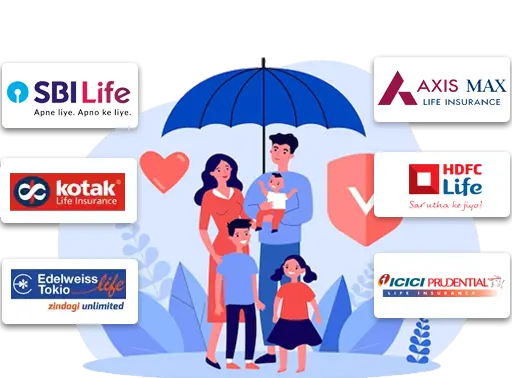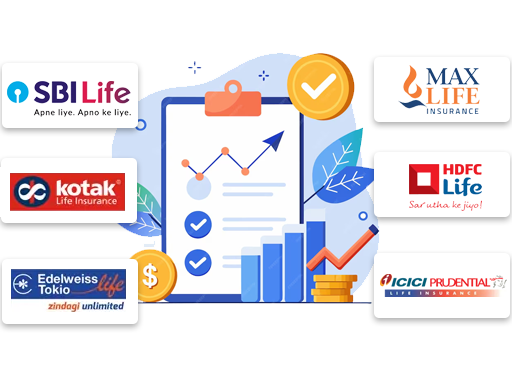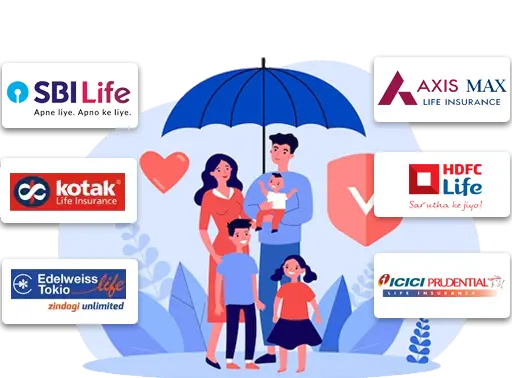- What is Death Benefit?
- Death Covered & Not Covered
- Death Benefit Claim Process

A boy-in-squares bagging escapades of switching streets in groove & sensing musical airy-notes from 6 1". Under wayed nyctophile sketching the walls of life from the panorama of anime.
Reviewed By:

Sharan Gurve has spent over 9 years in the insurance and finance industries to gather end-to-end knowledge in health and term insurance. His in-house skill development programs and interactive workshops have worked wonders in our B2C domain.
Updated on Jul 09, 2025 4 min read
Life Insurance Death Benefit - Understand Briefly
Life insurance is the most preferred option to secure the family's financial future in your absence through the death benefit offered by the policy. To put it simply, the amount that the life insurance policy promises to pay to the nominees in the event of death of the policyholder is called a death benefit.
The death benefit amount is tax-free under Section 10 (10D) of the Income Tax Act of 1961. There are two types of options available for taking a death benefit, in installments or as a lump sum. The death benefit amount can be used to pay off outstanding loans, replace the loss of income, and help your dependents to maintain their day to day living expenses.
What is a Death Benefit?
The death benefit is the pre-decided amount that the insurer pays to your dependents to help them financially after your unfortunate demise during the policy tenure.
Under Section 10 (10D) of the Income Tax Act 1961, your beneficiaries can enjoy a death benefit you leave for them without any tax exemptions. While buying a life insurance plan, you have to select the death benefit payout options either as installments or as a lump sum.
There are some instances when your claim can be rejected such as suicide, self-inflicted injuries, driving under drugs, participation in adventure activities, or being engaged in any kind of illegal activity. In these cases, no death benefit is paid to the nominees of the policy.
Types of Death Covered & Not Covered Under Life Insurance
Following are the circumstances when the death benefit is given or not given to your beneficiaries.
| S.no | Types of Deaths Covered | Types of Deaths Not Covered |
|---|---|---|
| 1 | Natural disaster | Suicide |
| 2 | Accidental death | Death due to illegal activities |
| 3 | Homicide | Intentyional self-inflected injuries |
| 4 | Terminal illness | Death due to pre-existing diseases that is not disclosed at policy inception |
| 5 | Disability-related deaths | Death due to sexually transmitted diseases |
| 6 | Medical Conditions | Death druing war or terrorism |
| 7 | Complications from surgery | Maternity related complications |
Tax Savings on Death Benefit
Apart from death benefits, you can also enjoy tax benefits in life insurance under different sections.
- Under Section 10 (10D) of the Income Tax Act 1961, your dependents can enjoy a death benefit amount you leave for them without any tax exemptions.
- Under Section 80C of the Income Tax Act 1961, the total premium paid towards the plan offers tax exemptions of up to Rs 1.5 lakh.
How To Claim Death Benefit in Life Insurance?
Life insurance offers assurance that your family will be taken care of in your absence. However, the proper knowledge of the death benefit claim process is required to ensure that the death benefit reaches them smoothly and serves its purpose.
Here, we've mentioned the step-by-step process of claiming life insurance after the policyholder's death.
-
Step 1 - Inform the Insurance Provider
Firstly, you must inform the insurer ASAP about the insured person's death. After that, you've to pick up a claim form from the insurer's nearest branch office. You can find the form online on their official website.
-
Step 2 - Attach Documents
To opt for a hassle-free claim process, submit certain documents with the death claim form to verify the information provided to the insurers about the policyholder's death.
Here, we've listed the required documents:
Mandatory Documents
- Policy Documents
- KYC documents (like a copy of photo ID and address proof) of a dependents
- Duly filled in and signed claim form
Type of Death Documents Required Medical//natural deaths Hospital discharge summary
Doctor's prescriptions
Hospital bills of the deceases policyholder
Additional treatmentsrecordsAccidental/unnatural deaths Autopsy/Post Mortem report
Death certificate issued by the local authority
Police Reports -
Step 3 - Claim Processing
Once the insurer receives all necessary documents and forms, they initiate the claim process. The provided papers are reviewed and verified, and a decision is made. According to the IRDAI rule, all insurers pay death claims within 30 calendar days. However, the duration is from when you submit all the required documents.
Conclusion
Death benefit secures your spouse and children from the devastating financial losses that may occur if something happens to you. The nominee can use the payout amount for living expenses and any medical or loan payments. In order to make sure that this payout reaches your family after you, make sure that you be truthful to the information that you provide to the insurer and submit all the necessary proofs at inception for a smooth claim process.
Death Benefit in Life Insurance: FAQs
1. What is the death benefit in life insurance?
The amount the nominee claims when the policyholder passes away during the policy term is called the death benefit.
2. How is the death benefit estimated?
The death benefit amount paid to your nominee equals the life coverage amount you choose when you buy your policy.
3. What is the death or maturity benefit?
Death benefit is a sum assured amount offered to your nominee if something happened to you, and a maturity benefit is an amount provided by the insurer once you outlive the policy tenure.
4. Who can claim death benefit?
The insurer pays a death benefit amount to the nominee of a life insurance policy when the policyholder dies.
5. Is death claim tax-free?
Under Section 10 (10D) of the Income Tax Act 1961, your dependents can enjoy a death benefit amount you leave for them without any tax exemptions.
Life Insurance Companies
Share your Valuable Feedback
4.6
Rated by 863 customers
Was the Information Helpful?
Select Your Rating
We would like to hear from you
Let us know about your experience or any feedback that might help us serve you better in future.


Written By: Sahil Singh Kathait
A boy-in-squares bagging escapades of switching streets in groove & sensing musical airy-notes from 6 1". Under wayed nyctophile sketching the walls of life from the panorama of anime.





















Do you have any thoughts you’d like to share?